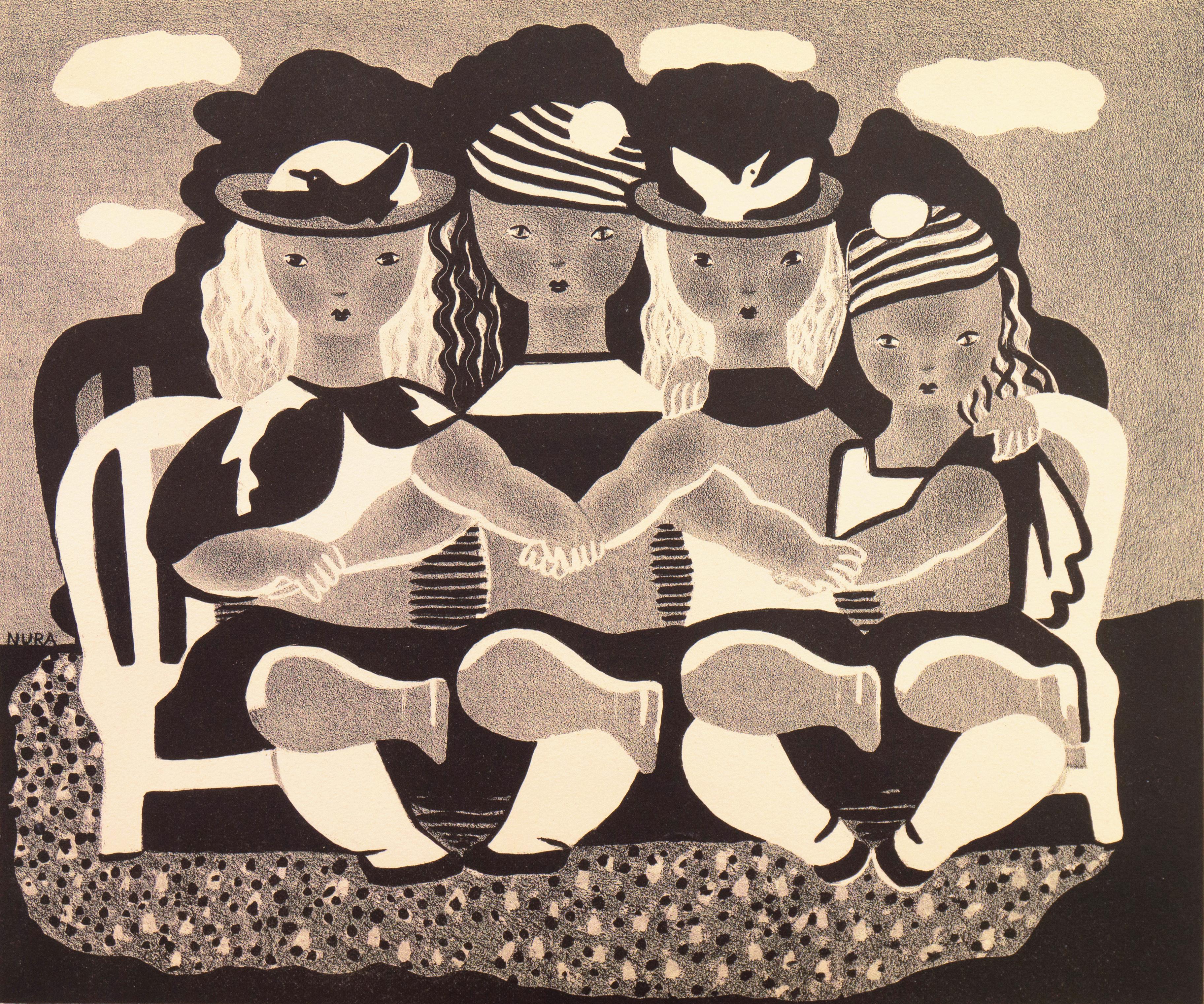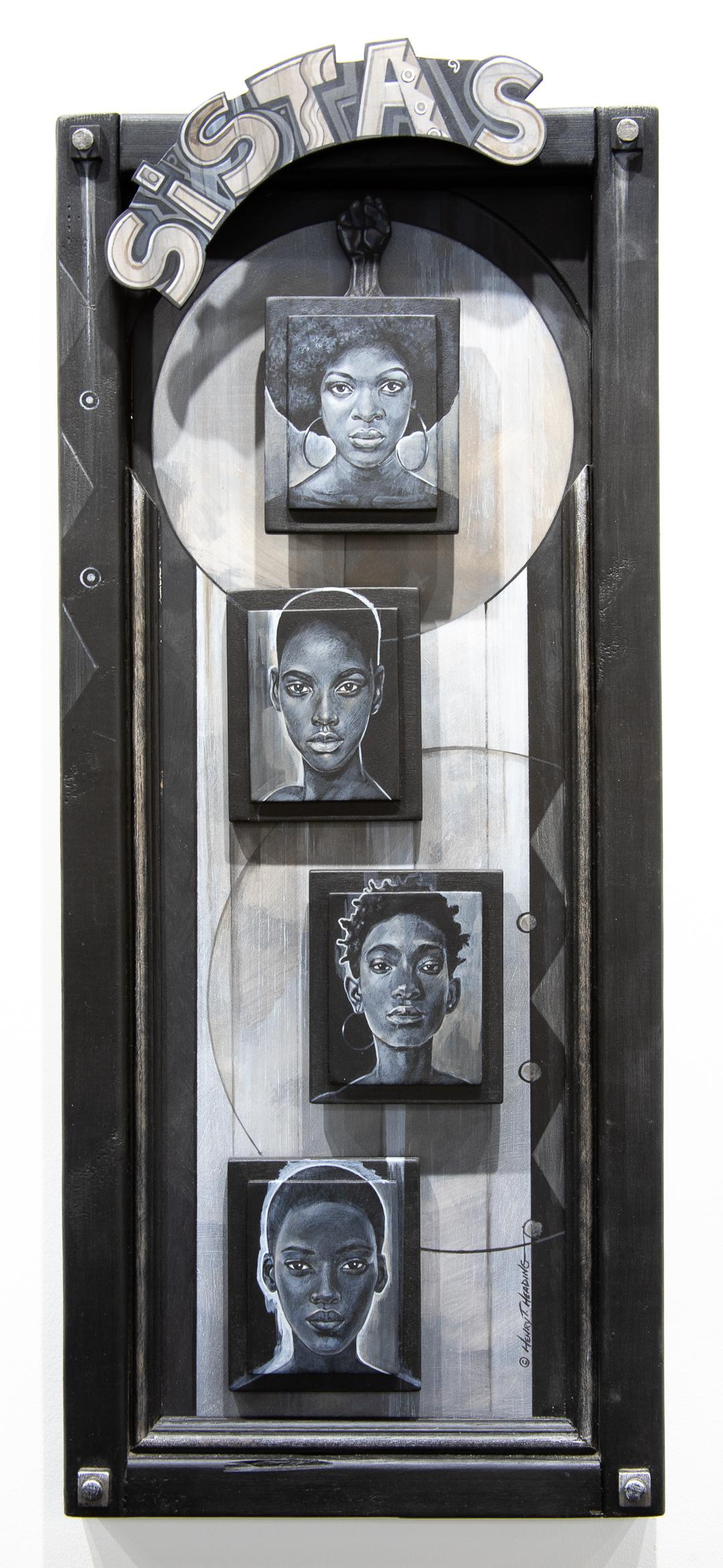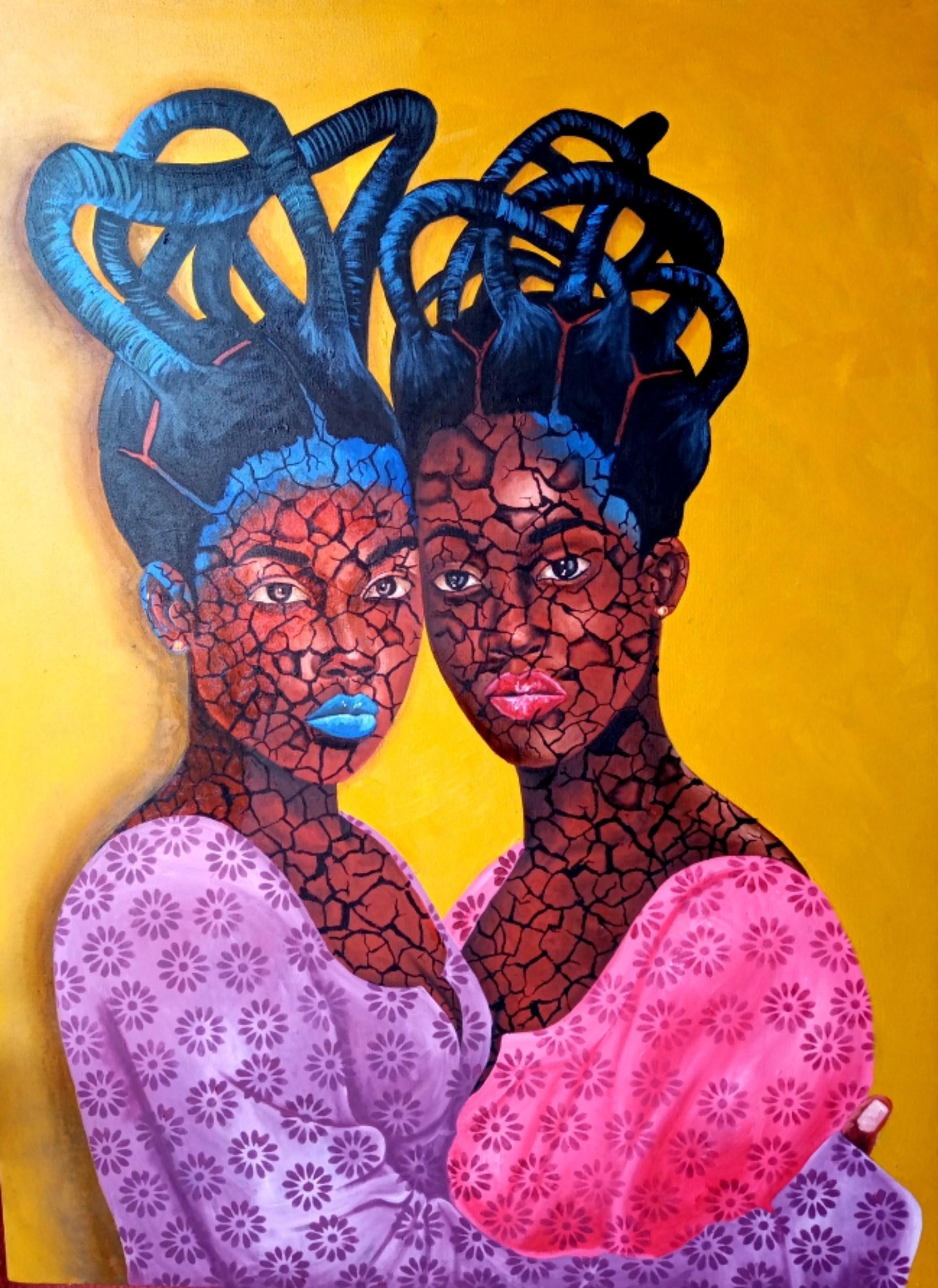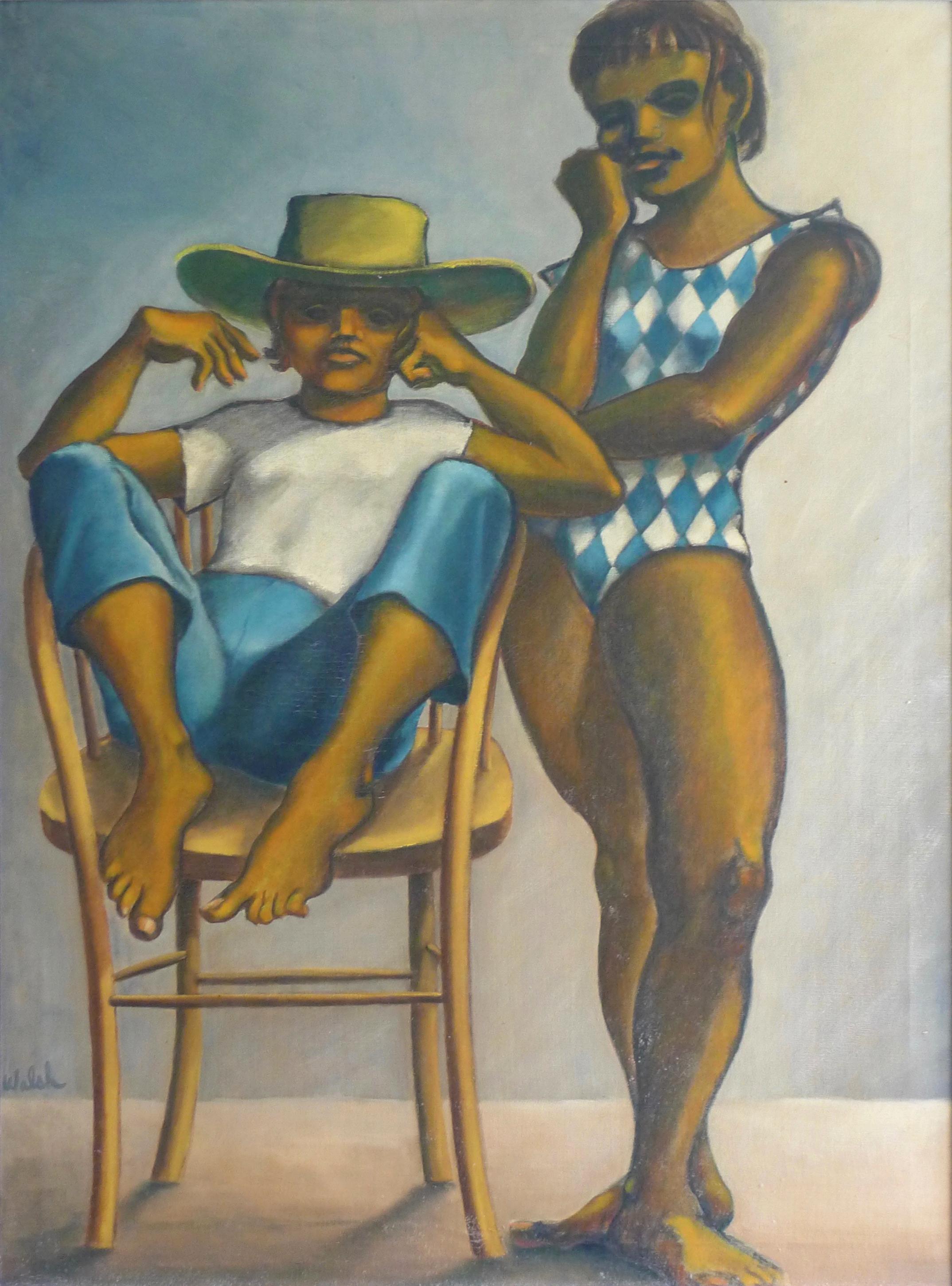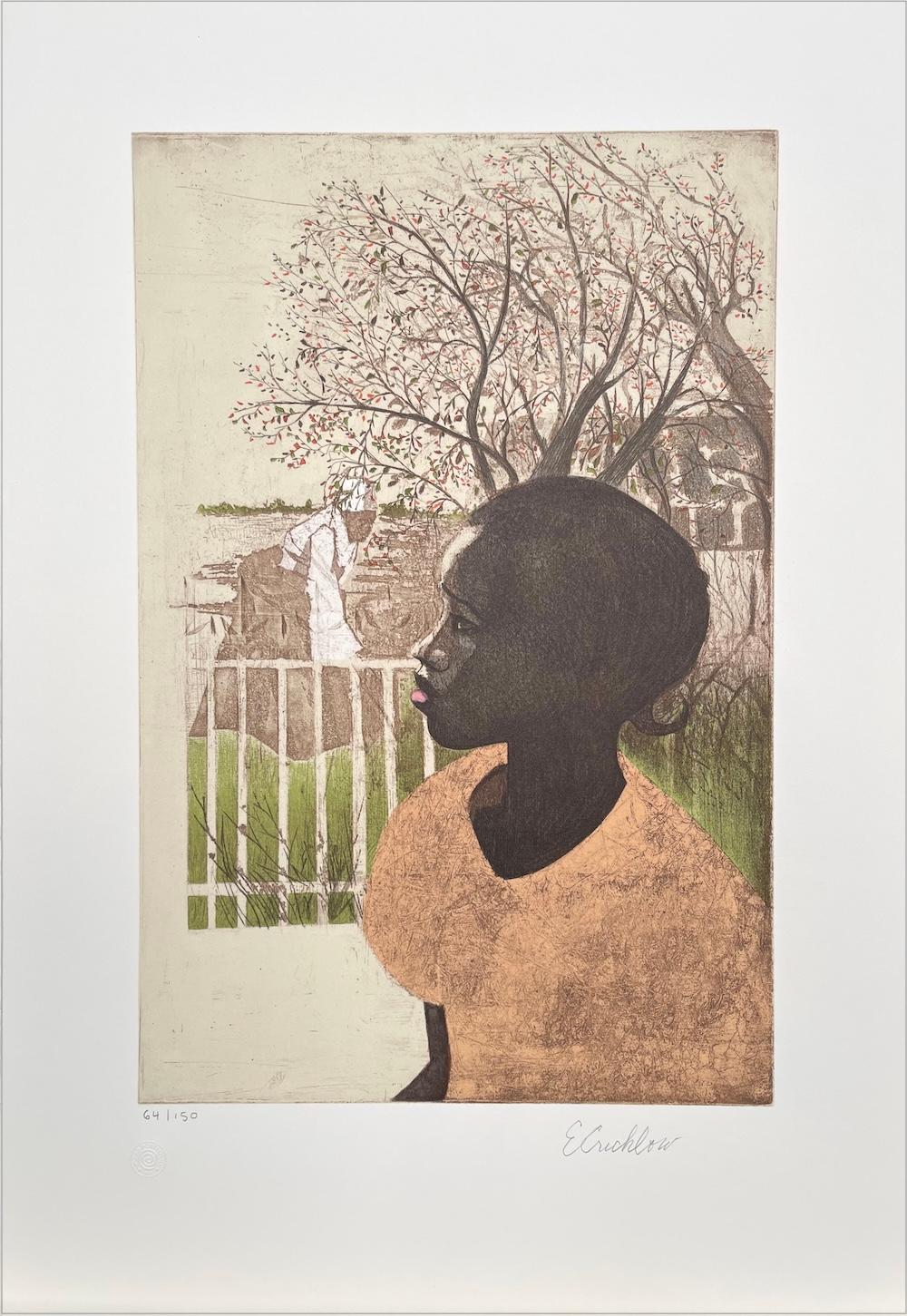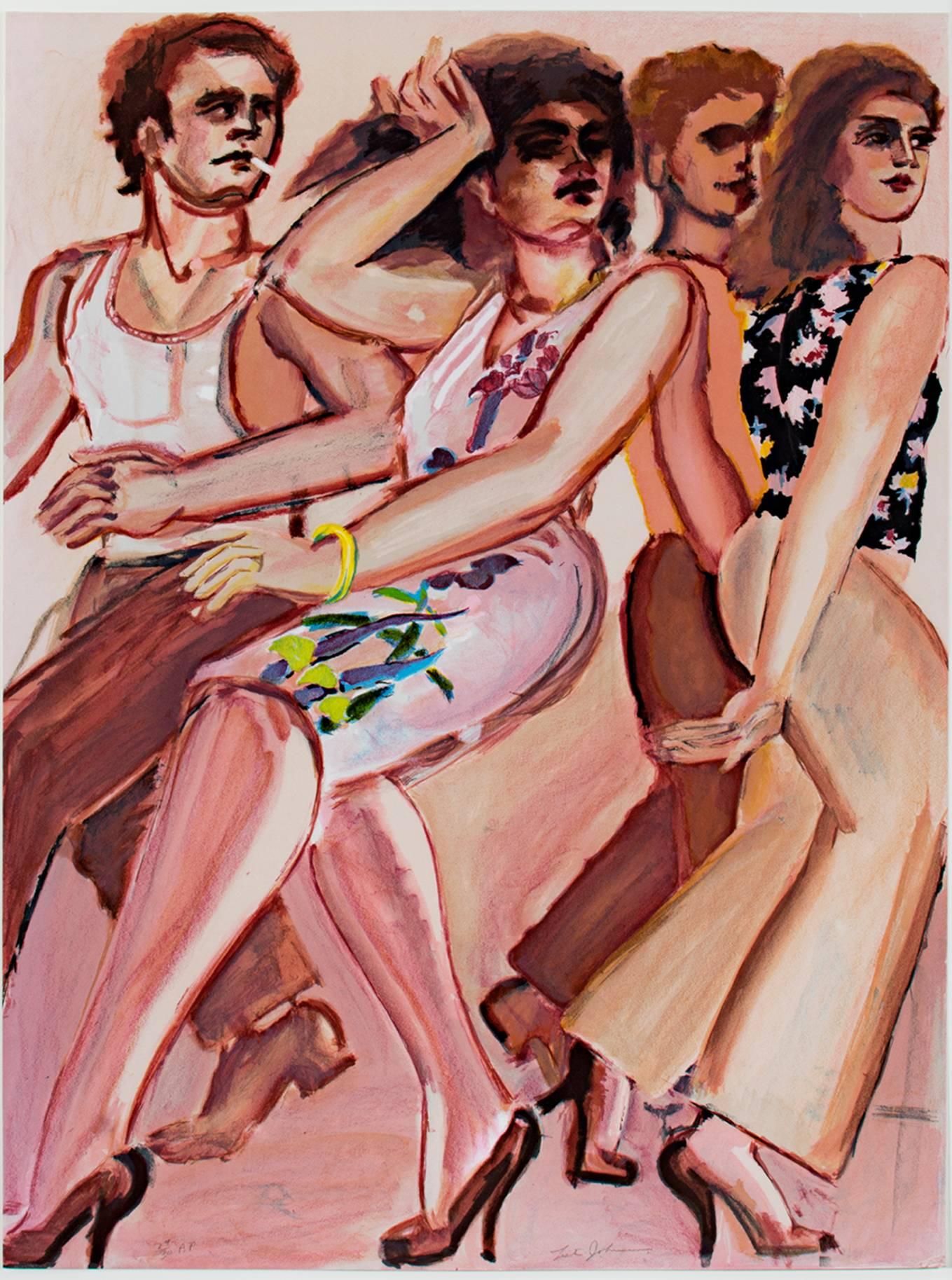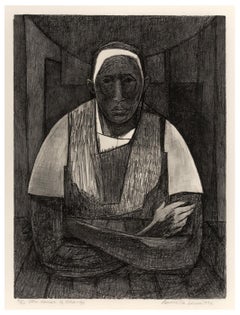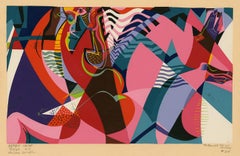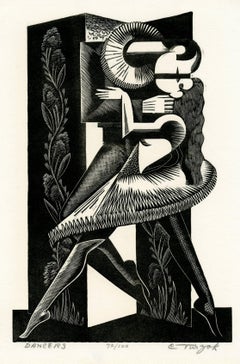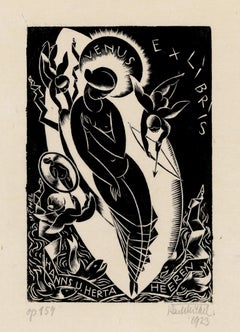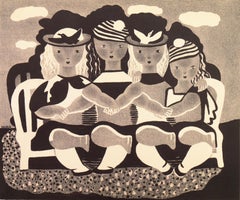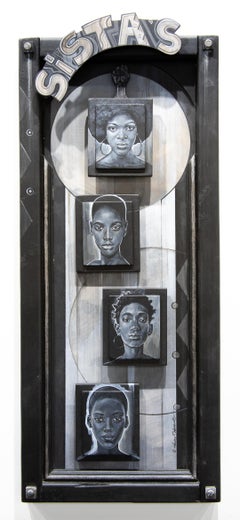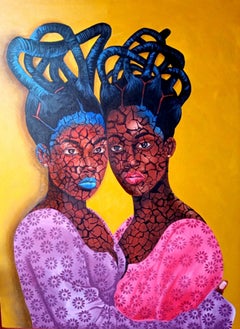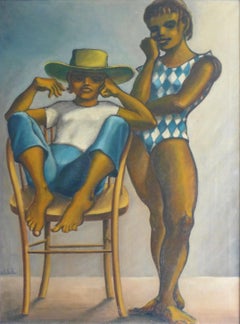Items Similar to 'Sisters' — Renowned Black American, Harlem Renaissance Artist
Want more images or videos?
Request additional images or videos from the seller
1 of 3
James Lesesne Wells'Sisters' — Renowned Black American, Harlem Renaissance Artist1928
1928
$3,500
£2,642.22
€3,049.45
CA$4,938.58
A$5,503.22
CHF 2,865.62
MX$66,416.03
NOK 35,927.17
SEK 33,946.56
DKK 22,763.01
About the Item
James Lesesne Wells, 'Sisters', linocut, edition not stated but small, 1928. Signed, titled, and annotated 'imp' in pencil. A fine impression on off-white wove Japan paper, with wide margins (1 7/8 to 3 3/4 inches), in excellent condition. Printed by the artist. Very scarce. Matted to museum standards, unframed.
Image size 8 3/16 x 6 3/4 inches (208 x 171 mm); sheet size 13 1/2 x 10 3/4 inches (343 x 273 mm).
Exhibition and Literature: 'Narratives of African American Art and Identity: The David C. Driskell Collection,' The Art Gallery at the University of Maryland, extensive touring exhibition, 1998-2000.
Collections: Pennsylvania Academy of the Fine Arts, Smithsonian Institution (Anacostia Community Museum).
ABOUT THE ARTIST
“Wells is more than an artist with a deep concern for his fellow man. He carries many of his themes a step further into an apocalyptic world, a world of revelation and shifting lights. … He works on large blocks in a bold free style. … His work has a vigor, therefore, that is not often used in the medium today.”
—Jacob Kainen (painter, critic, and collector) from Richard J. Powell’s 1986 essay Phoenix Ascending: The Art of James Lesesne Wells.
James Lesesne Wells was an American painter, printmaker, educator, and pioneering figure of the Harlem Renaissance, whose work established a vital connection between African heritage, modernist form, and African American cultural identity. Known for his innovative use of linoleum and woodblock printing, Wells played a key role in shaping 20th-century African American art and inspired countless students throughout his lengthy career as a teacher at Howard University.
Born in Atlanta, Georgia, Wells' early exposure to the arts came through church and community, where African American cultural traditions were central. He pursued formal artistic training at Lincoln University in Pennsylvania (earning a B.A. in 1924), followed by studies at the Pennsylvania Academy of the Fine Arts and the Barnes Foundation, where he encountered European modernists as well as traditional African sculpture, which profoundly influenced his style.
Wells moved to New York in the late 1920s, swiftly immersing himself in the lively artistic and intellectual scene of Harlem. There, he became associated with artists, writers, and thinkers of the Harlem Renaissance, contributing to the growth of Black cultural identity. Considered a mentor to many famed artists of the Harlem Renaissance, Wells served as director of a summer art workshop in Harlem where his assistants included Charles Alston, Jacob Lawrence, and Palmer Hayden. He developed a particular interest in printmaking, especially woodcuts and linocuts—mediums that were accessible, democratic, and capable of powerful graphic expression. His prints often depicted religious themes, African American life, and social justice topics, characterized by bold forms and rhythmic compositions that reflected both African art and modernist abstraction.
Throughout the 1930s, Wells exhibited widely in New York and participated in notable shows at the Harmon Foundation, which supported African American artists. His work was also disseminated through print portfolios and illustrated publications, establishing him as one of the most recognized African American printmakers of his era.
In 1929, Wells joined the faculty of Howard University in Washington, D.C., where he taught until his retirement in 1968. Early recognition of Wells' work came when he won a gold medal at the 1931 Harmon Foundation exhibition. At Howard, he mentored multiple generations of Black artists, including Alma Thomas, Elizabeth Catlett, and David Driskell. His teaching focused on both technical excellence and cultural awareness, encouraging students to draw inspiration from African art traditions and modernist innovations.
Wells also engaged with broader artistic communities, participating in the Works Progress Administration (WPA) during the Depression and exhibiting at prominent venues such as the Corcoran Gallery of Art and the Smithsonian Institution. His reputation as a leading African American modernist grew steadily through the mid-20th century.
In the postwar years, Wells continued exhibiting while dedicating more time to teaching and art writing. During his retirement, he received renewed recognition for his pioneering contributions to African American printmaking. In the 1980s and early 1990s, major exhibitions and publications reevaluated his influence on American modernism and Black art history.
Wells’ work is held in major collections, including the Baltimore Museum of Art, Howard University Gallery of Art, Library of Congress, Metropolitan Museum of Art, Museum of Modern Art, National Gallery of Art, The Phillips Collection, and the Smithsonian American Art Museum.
- Creator:James Lesesne Wells (1902 - 1992, American)
- Creation Year:1928
- Dimensions:Height: 8.19 in (20.81 cm)Width: 6.75 in (17.15 cm)
- Medium:
- Movement & Style:
- Period:
- Condition:
- Gallery Location:Myrtle Beach, SC
- Reference Number:Seller: 1043501stDibs: LU532316829262
About the Seller
5.0
Recognized Seller
These prestigious sellers are industry leaders and represent the highest echelon for item quality and design.
Platinum Seller
Premium sellers with a 4.7+ rating and 24-hour response times
Established in 1995
1stDibs seller since 2016
316 sales on 1stDibs
Typical response time: 1 hour
Associations
International Fine Print Dealers Association
- ShippingRetrieving quote...Shipping from: Myrtle Beach, SC
- Return Policy
Authenticity Guarantee
In the unlikely event there’s an issue with an item’s authenticity, contact us within 1 year for a full refund. DetailsMoney-Back Guarantee
If your item is not as described, is damaged in transit, or does not arrive, contact us within 7 days for a full refund. Details24-Hour Cancellation
You have a 24-hour grace period in which to reconsider your purchase, with no questions asked.Vetted Professional Sellers
Our world-class sellers must adhere to strict standards for service and quality, maintaining the integrity of our listings.Price-Match Guarantee
If you find that a seller listed the same item for a lower price elsewhere, we’ll match it.Trusted Global Delivery
Our best-in-class carrier network provides specialized shipping options worldwide, including custom delivery.More From This Seller
View AllThe House of Shango — African American artist
By Samella Lewis
Located in Myrtle Beach, SC
Samella Sanders Lewis, 'The House of Shango', lithograph, 1992, edition 60. Signed, dated, titled, and numbered '31/60' in pencil. A superb, richly-inked impression, on Arches cream wove paper; the full sheet with margins (1 1/4 to 3 1/2 inches), in excellent condition. Image size 24 x 18 inches (610 x 457 mm); sheet size 30 inches x 22 1/4 inches (762 x 565 mm). Archivally matted to museum standards, unframed.
ABOUT THIS WORK
“The title of this piece is an unmistakable harkening to African roots. Shango is a religious practice with origins in Yoruba (Nigerian) belief, deifying a god of thunder by the same name. Shango has been adopted in the Caribbean, most notably in Trinidad and Tobago, a fact that underscores the importance of transnationalism to Samella Lewis’s piece. Her work often grapples with issues of race in the U.S., and The House of Shango is no exception. Through a reliance on the gradual transformation of Shango—one that took place across continents and time—Lewis’s piece forms a powerful link between black Americans and their African and Caribbean counterparts. The figure depicted in the piece appears to emerge, quite literally, from the house of Shango. Given the roots and transformative process of the religion, The House of Shango can draw attention to the historical intersections to which black American culture is indebted.” —Laura Woods, Scripps College, Ruth Chander Williamson Gallery, Collection Highlights, 2018
ABOUT THE ARTIST
Samella Lewis’ lifelong career as an artist, art historian, critic, curator, collector, and advocate of African American art has helped empower generations of artists in the United States and worldwide, earning her the designation “the Godmother of African American art.”
Born and raised in Jim Crow era New Orleans, Lewis began her art education at Dillard University in 1941, transferring to Hampton University in Virginia, where she earned her B. A. and master's degrees. She completed her master's and a doctorate in art history and cultural anthropology at Ohio State University in 1951, becoming the first female African American to earn a doctorate in fine art and art history.
Lewis taught art at Morgan State University while completing her doctorate. She became the first Chair of the Fine Arts Department at Florida A&M University in 1953. That same year Lewis also became the first African American to convene the National Conference of African American artists held at Florida A&M University. She was a professor at the State University of New York, California State University, Long Beach, and at Scripps College in Claremont, California. Lewis co-founded, with Bernie Casey, the Contemporary Crafts Gallery in Los Angeles in 1970. In 1973, she served on the selection committee for the exhibition BLACKS: USA: 1973 held at the New York Cultural Center.
Samella Lewis's 1969 catalog 'Black Artists on Art', featured accomplished black artists typically overlooked in mainstream art galleries. She said of the book, "I wanted to make a chronology of African American artists, and artists of African descent, to document our history. The historians weren't doing it. It was really about the movement."
From the 1960s through the 1970s, her work, which included lithographs, linocuts, and serigraphs, reflected her concerns with the values of human dignity, democracy, and freedom of expression. Between 1969 and 70, Lewis and E.J. Montgomery were consultants for a groundbreaking exhibition at the Oakland Public L designed to create greater awareness of African American history and art.
Lewis was the founder of the International Review of African American Art in 1975. In 1976, she founded the Museum of African-American Art with a group of artistic, academic, business, and community leaders in Los Angeles, California. Lewis, the museum’s senior curator, organized exhibitions and developed new ways of educating the public about African American art. She celebrated African American art as an 'art of experience’ inspired by the artists’ lives. And she espoused the concept of African American art as an 'art of tradition', urging museums to explore the African roots of African American art. In 1984, Lewis produced an extensive monograph on Elizabeth Catlett, her beloved mentor at Dillard University.
Lewis has been collecting art since 1942, focusing primarily on the WPA era and work created during the Harlem Renaissance. Pieces from her collection were acquired by the Hampton University Museum in Virginia, the world’s earliest collection of African American fine art...
Category
1990s Realist Figurative Prints
Materials
Lithograph
Sister Kate — Mid-century, Jazz-inspired Modernism
By James Houston McConnell
Located in Myrtle Beach, SC
James Houston McConnell, 'Sister Kate', color serigraph, 1947, edition 24. Signed, dated, titled, and numbered '24' in pencil. Annotated '10.00 - 19 colors - 24 copies - #24' in pencil. A fine impression, with vibrant, fresh colors, on heavy tan wove paper, with full margins (11/16 to 1 1/2 inches). Tack holes in the four margin corners, well away from the image, otherwise in excellent condition. Matted to museum standards, unframed. Scarce.
Another of McConnell's mid-century modernist, jazz-inspired serigraphs, 'Combo', is featured in the British Museum's 2008 publication (and traveling exhibition) 'The American Scene: Prints from Hopper to Pollock'.
ABOUT THE IMAGE
"I Wish I Could Shimmy Like My Sister Kate", often simply "Sister Kate", is an up-tempo jazz dance song, written by Armand J. Piron and published in 1922. The lyrics of the song are narrated in the first person by Kate's sister, who sings about Kate's impressive dancing skill and her wish to be able to emulate it. She laments that she's not quite "up to date", but believes that dancing like "Sister Kate" will rectify this, and she will be able to impress "all the boys in the neighborhood" like her sister.
Over the years this song has been performed and recorded by many artists, including Frances Faye and Rusty Warren, a 1959 version by Shel Silverstein...
Category
1940s American Modern Abstract Prints
Materials
Screen
'Dancers' — 1930s American Modernism
By Charles Turzak
Located in Myrtle Beach, SC
Charles Turzak, 'Dancers', 1939, wood engraving, edition 100. Signed, titled, and numbered 72/100 in pencil. A fine, richly-inked impression, on off-white Japan paper, with full marg...
Category
Mid-20th Century Art Deco Figurative Prints
Materials
Woodcut
'Venus' — German Expressionism
By Karl Michel
Located in Myrtle Beach, SC
Karl Michel, 'Venus, Ex Libris - Hanns U. Herta Heeren', woodcut, 1923, edition not stated but small. Signed, dated, and numbered 'op.154' in pencil. Signed in the block, lower left. A fine impression, on cream Japan paper, with full margins (15/16 to 2 11/16 inches), in good condition. Printed by the artist. Matted to museum standards (unframed).
.
Translation: Venus Ex Libris for Hanns and Herta Heeren.
Image size 5 15/16 x 4 inches (156 x 102 mm); sheet size 9 5/8 x 6 inches (245 x 152 mm).
ABOUT THE ARTIST
Karl Michel (1889-1984) was a noted graphic designer and expressionist printmaker during Germany's pre-Nazi Weimar Republic (1919-1933). Michel’s work was the subject of a feature article in the influential German graphic design magazine Das Plakat (The Poster) in 1920. An anti-war advocate, Michel created a suite of 12 wood engravings depicting his impressions of the humanitarian toll of WWII entitled ‘Humanitas’ (Humanity). The German publishing house Greifenverlag published the series in a reduced folio of unsigned prints.
Michel’s graphic work is held in the permanent collections of the Auckland War Memorial Museum (New Zealand), Frederikshavn Kunstmuseum & Exlibrissamling (Denmark), Museum of Applied Arts (Budapest), The Robert Gore Rifkind Center for German Expressionist Studies at the Los Angeles County Museum of Art, and the German Expressionism...
Category
1920s Expressionist Figurative Prints
Materials
Woodcut
Portrait of an African Woman — 1920s Modernism
By Boris Lovet-Lorski
Located in Myrtle Beach, SC
Boris Lovet-Lorski, Untitled (Portrait of an African Woman), lithograph, edition 250, 1929. Signed and numbered 13 in pencil. Number 13 of Volume 2, a series of 10 lithographs publis...
Category
1920s Art Deco Figurative Prints
Materials
Lithograph
$760 Sale Price
20% Off
'Mondo Negro III' — African American artist
By Camille Billops
Located in Myrtle Beach, SC
Camille Billops, 'Mondo Negro III', color etching, 2000, edition 20. Signed, dated, titled, and numbered '7/20' in pencil. A superb, richly-inked impre...
Category
Early 2000s Contemporary Figurative Prints
Materials
Etching
You May Also Like
'Sisters', Paris, Salon d'Automne, New York, Art Deco, AIC, ASL, Woman Artist
By Nura Ulreich
Located in Santa Cruz, CA
Signed center left, 'Nura' for Nura Woodson Ulreich (American, 1899–1950) and created circa 1935; additionally stamped, verso, with certification of authenticity.
An early twentieth...
Category
1930s Art Deco Figurative Prints
Materials
Paper, Lithograph
"Sistas" Figurative, Portraits, Words, Frontal, Acrylic
By Henry Heading
Located in Detroit, MI
“Sistas” is a portrait collection of strong, intelligent women who look capable of taking on and managing whatever life has to hand them. That they are visually beautiful is actually beside the point for Henry has managed to capture in paint their inner beauty flowing from their eyes and features. Henry has sensitively revealed each individual’s personality. These are women you want to know and from whom you want to feel their power.
Henry says that, “Painting is like breathing for me. I do so daily and appreciate my gift and ability. Perfection drives me as I create each piece. It must be unique. It must stand out, and is not complete until that special quality is achieved in my eyes.”
Being able to create is an essential part of my life. It is an extension of my innermost thoughts and imagination. My primary focus of art is realism--using oils and acrylics. Occasionally, I switch mediums and design and build three dimensional pieces. Working mixed mediums, I use various wood, metal and paint, thus allowing me to achieve the visual effects I am looking for. Many of my pieces have been derived from my attraction to Art Deco and Ethnic designs. I am not satisfied until each piece, regardless of the medium or size, has reached the highest possible level of aesthetic quality and craftsmanship I can give it.
I have enjoyed creating art since childhood. While a student at Martin Luther King Jr. high school in Detroit, I created and presented a portrait to then Mayor Coleman A. Young. A scholarship from Center for Creative Studies now the College for Creative Studies afforded me the opportunity to work towards and receive a BA in Fine Arts. Faculty and graduates of CCS include Richard Jerzy, Harry Bertoia, Doug Chaing (currently director of Lucas Film), Stephen Dinehart (game maker, writer, designer connected with The David Lynch Foundation), Tyree Guyton (international artist), Herb Babcock, Jerome Feretti, Kevin Siembieda (writer, designer and publisher of role-playing games), Renee Radell, Philip Pearlstein, Charles McGee (nationally recognized African American sculptor of animal and dancing spirits), Philip Pearlstein (2000 Honorary Doctorate, Modern Realism style), John Louis Krieger (American Modern), William Girard (American Modern), and Charles Culver.
Mr. Heading understands the joy found in art and how it affects a young person's heart. He has shared his love for art as a mentor/teacher at the Virgil L. Carr Center in Detroit, Michigan. Students not only grew in their art experience, but also exhibited at the Ann Arbor Art Fair.
Winning the 2013 MI Great Artist Competition was an honor for Mr. Heading. He is thankful to Park West Gallery owner Albert Scaglione and Oakland County Executive L. Brooks Patterson for the opportunity. Mr. Heading has been featured on ASPIRE TV, shows at the Charles H. Wright Museum of African American History, the National Conference of Artists and other numerous galleries. In addition, he is a book illustrator. His murals create a beautiful focal point and conversation piece on the walls of homes, churches and health care facilities. His art and furniture is enjoyed and treasured by collectors across the United States and Canada. Kohei Suzuki, the former Mayor of Toyota City, Japan has a box designed by Henry. Mr. Heading's work is part of the major TCF Convention Center's permanent collection located in the downtown business district in Detroit, Michigan.
His first attempt at mosaic tile was creating a Tiger sculpture to benefit the Detroit Tigers...
Category
21st Century and Contemporary Contemporary Figurative Paintings
Materials
Wood, Masonite, Acrylic
Sisters - 21st Century, Contemporary, Figurative Portrait, Africa Women, Modern
Located in Ibadan, Oyo
A captivating modern contemporary painting that beautifully captures the unbreakable bond shared between two sisters, connected not only by blood but also by an enduring love and con...
Category
21st Century and Contemporary Expressionist Portrait Paintings
Materials
Canvas, Oil, Acrylic
Two Sisters
By Kenneth B Walsh
Located in East Hampton, NY
Two Sisters
Casein Paint
Varnish
Comes framed
About the Artist:
Kenneth B Walsh (1922-1980)
In the 1950s, Kenneth Bonar Walsh came to Montauk from New Yo...
Category
1970s Cubist Nude Paintings
Materials
Varnish, Casein
NEW DREAMS Original Lithograph, Black History, African American Women
By Ernest Crichlow
Located in Union City, NJ
NEW DREAMS is an original limited edition lithograph by the Harlem Renaissance, social realist African-American artist ERNEST CRICHLOW (1914-2005). NEW DREAMS was printed from hand d...
Category
Early 2000s Contemporary Portrait Prints
Materials
Lithograph
"Untitled - LJ #53, " Lithograph signed by Lester Johnson
By Lester Johnson
Located in Milwaukee, WI
"Untitled - LJ#53" is an original color lithograph by Lester Johnson. The artist signed the piece in the lower center and also wrote the edition number,...
Category
1970s Expressionist Figurative Prints
Materials
Lithograph
